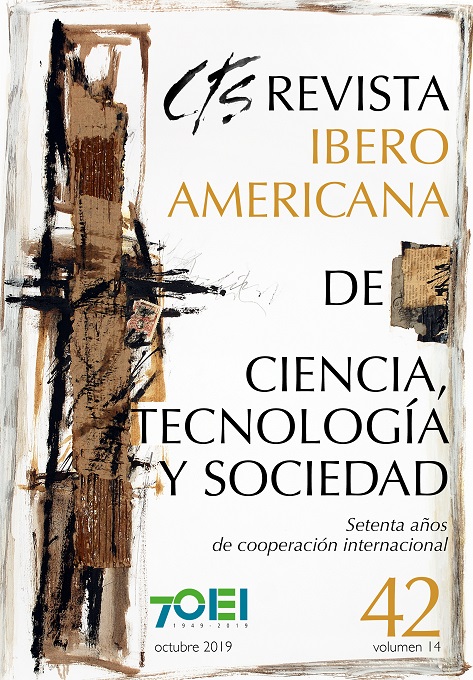STS Education: A Space for Ibero-American Cooperation
Keywords:
STS education, Ibero-American cooperation, techno-scientific controversiesAbstract
Cooperation is the set of activities carried out among various actors through multiple modalities and on a mutually beneficial basis. Under this principle, it is possible to see a diverse range of initiatives that have allowed the consolidation of the academic field of STS education at the Ibero-American level, in part thanks to the continuous support of OEI for more than twenty years. This article addresses three types of strategies that are the foundation of STS education initiatives that have been the subject of cooperation. Methodologically, a hermeneutical analysis has been adopted, in an attempt to achieve a comprehensive understanding of the proposed approaches: techno-scientific controversies, participation in science and the approach of a scientific culture. These approaches support the didactics implemented by Ibero-American teachers, such as Simulated Cases, the use of the history of science to learn the nature of science (NOS) and the Containers for Scientific Culture.Downloads
References
ACEVEDO-DÍAZ, J. A. y GARCÍA-CARMONA, A. (2016a): “Algo antiguo, algo nuevo, algo prestado. Tendencias sobre la naturaleza de la ciencia en la educación científica”, Revista Eureka sobre Enseñanza y Divulgación de las Ciencias, vol. 13, nº 1, pp. 3-19.
ACEVEDO-DÍAZ, J. A. y GARCÍA-CARMONA, A. (2016b): “Rosalind Franklin y la estructura del ADN: un caso de historia de la ciencia para aprender sobre la naturaleza de la ciencia”, Revista Científica, vol. 25, pp. 162-175.
ACEVEDO-DÍAZ, J. A. y GARCÍA-CARMONA, A. (2017): Controversias en la historia de la ciencia y cultura científica, Madrid, Los Libros de la Catarata.
ACEVEDO-DÍAZ, J. A., GARCÍA-CARMONA, A. y ARAGÓN-MÉNDEZ, M. (2017a): Enseñar y aprender sobre naturaleza de la ciencia mediante el análisis de controversias de historia de la ciencia. Resultados y conclusiones de un proyecto de investigación didáctica, Documentos de trabajo nº 5, IBERCIENCIA, Madrid, OEI.
ACEVEDO-DÍAZ, J., GARCÍA-CARMONA, A. y ARAGÓN-MÉNDEZ, M. (2017b): “Historia de la ciencia para enseñar naturaleza de la ciencia: una estrategia para la formación inicial del profesorado de ciencia”, Educación Química, vol. 28, pp. 140-146.
BUCCHI, M. y NERESINI, F. (2008): “Science and public participation”, en E. Hackett, O. Amsterdamska, M. Lynch y J. Wacjman (eds.): The handbook of science and technology studies, Cambridge, The MIT Press, pp. 449-472.
GARCÍA-CARMONA, A. (2014): “Naturaleza de la ciencia en noticias científicas de la prensa: análisis del contenido y potencialidades didácticas” Enseñanza de las Ciencias, nº 32.3, pp. 493-509
LATOUR, B. (2001): La esperanza de pandora. Ensayos sobre la realidad de los estudios de la ciencia, Barcelona, Gedisa.
LÓPEZ CEREZO, J. A. (2014): “17 años de colaboración de la Universidad de Oviedo con la OEI” Iberoamérica divulga, 14 de julio de 2014. Disponible en: https://www.oei.es/historico/divulgacioncientifica/?17-anos-de-colaboracion-de-la-Universidad-de-Oviedo-con-la-OEI. Consultado el 30 de julio de 2019.
MAKADOK, R. (2001): “Toward a synthesis of the resource-based and dynamic-capability views of rent creation”, Strategic Management Journal.
MARTÍN, M. y OSORIO, C. (2003): “Educar para participar en ciencia y tecnología. Un proyecto para la difusión de la cultura científica”, Revista Iberoamericana de Educación, vol. 32.
MARTÍN, M. y OSORIO, C. (2012): “Comunidad de educadores iberoamericanos para la cultura científica. Una red para la innovación”, Revista Iberoamericana de Educación, Monográfico: Educación para la cultura científica, vol. 58, pp. 193-218.
MCMULLIN, E. (1987): “Scientific controversy and its termination”, en H. T. Engelhardt Jr y A. L. Caplan (eds.): Scientific controversies. Case studies in the resolution and closure of disputes in science and technology, Nueva York, Cambridge University Press, pp. 49-91.
MILLER, J. (1987): “Scientific literacy in the United States”, Communicating Science to the Public, pp. 19–40.
OLIVERAS, B. y SANMARTÍ, N. (2009): “La lectura como medio para desarrollar el pensamiento crítico”, Educación Química, número extra, pp. 233-245.
PESTRE, D. (1994): “Comment écrit-on l'histoire des sciences: nouveaux objets, nouvelles pratiques et liens avec l'histoire culturelle et social”, Seminaire, 4 de octubre, París, La Villette.
RAMOS, M. y DA SILVA, H. (2007): “Discutindo controvérsias científicas em sala de aula sob o enfoque Ciência, Tecnologia, Sociedade e Ambiente”, I Simpósio de Pesquisa em Ensino e História de Ciências da Terra, Campinas, pp. 241-248.
ROMERO, C. (2018): “Proyecto Tibanica. Una controversia sobre humedales”, trabajo de grado maestría en educación en tecnología, Bogotá, Universidad Distrital Francisco José de Caldas.
ROWE, G., y FREWER, L. (2005): “A typology of public engagement mechanisms”, Science, Technology & Human Values, vol. 30, nº 2, pp. 251-290.
SEBASTIÁN, J. (2004): “La cultura de la cooperación en la I+D+i”, Curso de Especialista en CTS+I, Madrid, OEI.
VEYNE, P. (1984): Cómo se escribe la historia. Foucault revoluciona la historia, Madrid, Alianza Editorial.
Downloads
Published
How to Cite
Issue
Section
License
All CTS's issues and academic articles are under a CC-BY license.
Since 2007, CTS has provided open and free access to all its contents, including the complete archive of its quarterly edition and the different products presented in its electronic platform. This decision is based on the belief that offering free access to published materials helps to build a greater and better exchange of knowledge.
In turn, for the quarterly edition, CTS allows institutional and thematic repositories, as well as personal web pages, to self-archive articles in their post-print or editorial version, immediately after the publication of the final version of each issue and under the condition that a link to the original source will be incorporated into the self-archive.











